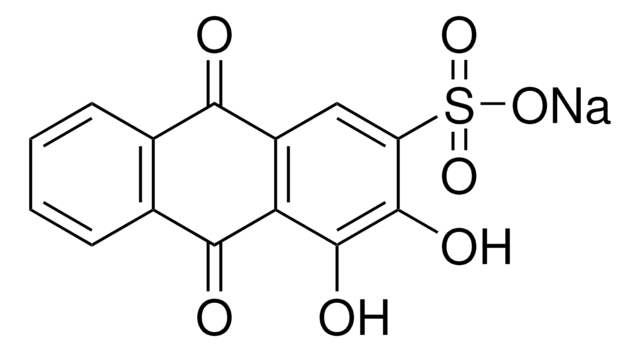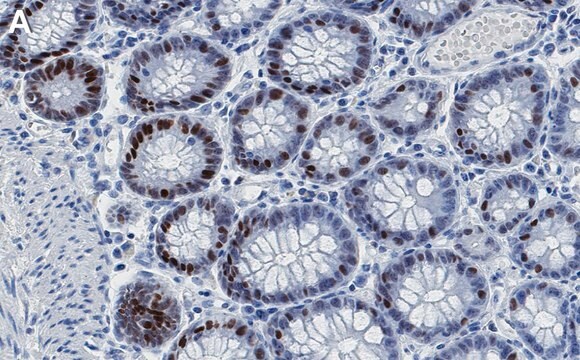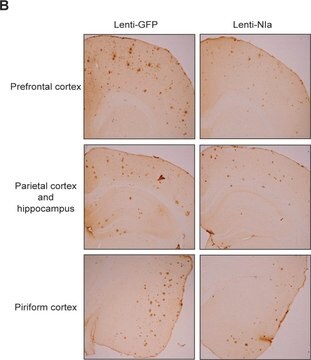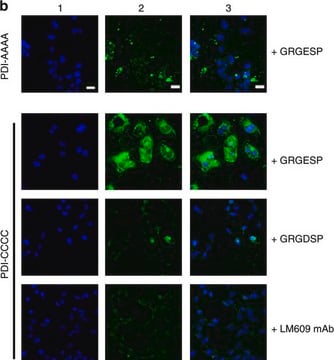MABN2728
Anti-FoxA2/HNF-3b Antibody, clone 4C7
Synonyme(s) :
Forkhead box A2, HNF-3 beta, FOXA2, Hepatocyte nuclear factor-3beta
About This Item
Produits recommandés
Source biologique
mouse
Niveau de qualité
Forme d'anticorps
purified antibody
Type de produit anticorps
primary antibodies
Clone
4C7, monoclonal
Poids mol.
calculated mol wt 47.23 kDa
observed mol wt ~50 kDa
Produit purifié par
using protein G
Espèces réactives
human, chicken, mouse
Conditionnement
antibody small pack of 100
Technique(s)
electron microscopy: suitable
immunocytochemistry: suitable
immunofluorescence: suitable
immunohistochemistry: suitable
immunoprecipitation (IP): suitable
western blot: suitable
Isotype
IgG1κ
Séquence de l'épitope
Unknown
Numéro d'accès Protein ID
Numéro d'accès UniProt
Température de stockage
2-8°C
Informations sur le gène
chicken ... HNF-3beta(395539)
Spécificité
Immunogène
Application
Evaluated by Western Blotting in HepG2 cell lysate.
Western Blotting Analysis: A 1:500 dilution of this antibody detected FoxA2/HNF-3b, in HepG2 cell lysate.
Tested Applications
Electrophoretic Mobility Shift Assay: A representative lot detected FoxA2/HNF-3b in Electrophoretic Mobility Shift Assay (EMSA) (Foucher, I., et al. (2003). Development. 130(9): 1867-76).
Immunofluorescence Analysis: A representative lot detected FoxA2/HNF-3b in Immunofluorescence applications (Camp, D., et al. (2014). Development. 141(20): 3879-88; Hoelzl, M.A., et al. (2017). Dev Biol. 429(1): 132-146).
Immunoprecipitation Analysis: A representative lot immunoprecipitated FoxA2/HNF-3b in Immunoprecipitation applications (van den Brink, G.R., et al. (2001). Gastroenterology. 121(2):317-28).
Immunohistochemistry Applications: A representative lot detected FoxA2/HNF-3b in Immunohistochemistry applications (Ericson, J., et al. (1996). Cell. 87(4):661-73; Kwon, O., et al. (1998). J Clin Invest. 101(10):2054-64; Rousa, F.M., et al. (2000). Mol Cell Biol. 20(21):8264-82; van den Brink, G.R., et al. (2001). Gastroenterology. 121(2):317-28; Camp, D., et al. (2014). Development. 141(20):3879-88; Hoelzl, M.A., et al. (2017). Dev Biol. 429(1):132-146; Amarnath, S., et al. (2017). J Cell Sci. 130(1):119-131).
Immunocytochemistry Analysis: A representative lot detected FoxA2/HNF-3b in Immunohistochemistry applications (Nagase, T., et al. (2009). Dev Dyn. 238(5):1118-30).
Western Blotting Analysis: A representative lot detected FoxA2/HNF-3b in Western Blotting applications (Rousa, F.M., et al. (2000). Mol Cell Biol. 20(21):8264-82; van den Brink, G.R., et al. (2001). Gastroenterology. 121(2):317-28).
Note: Actual optimal working dilutions must be determined by end user as specimens, and experimental conditions may vary with the end user.
Description de la cible
Forme physique
Reconstitution
Stockage et stabilité
Autres remarques
Clause de non-responsabilité
Vous ne trouvez pas le bon produit ?
Essayez notre Outil de sélection de produits.
Code de la classe de stockage
12 - Non Combustible Liquids
Classe de danger pour l'eau (WGK)
WGK 1
Point d'éclair (°F)
Not applicable
Point d'éclair (°C)
Not applicable
Certificats d'analyse (COA)
Recherchez un Certificats d'analyse (COA) en saisissant le numéro de lot du produit. Les numéros de lot figurent sur l'étiquette du produit après les mots "Lot" ou "Batch".
Déjà en possession de ce produit ?
Retrouvez la documentation relative aux produits que vous avez récemment achetés dans la Bibliothèque de documents.
Notre équipe de scientifiques dispose d'une expérience dans tous les secteurs de la recherche, notamment en sciences de la vie, science des matériaux, synthèse chimique, chromatographie, analyse et dans de nombreux autres domaines..
Contacter notre Service technique








